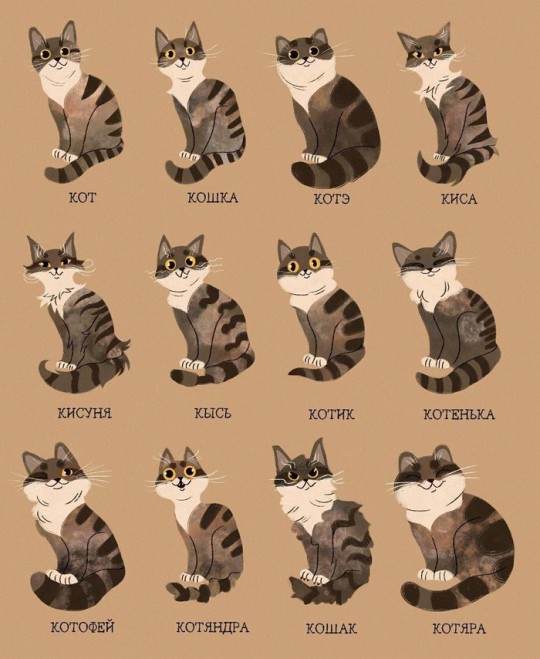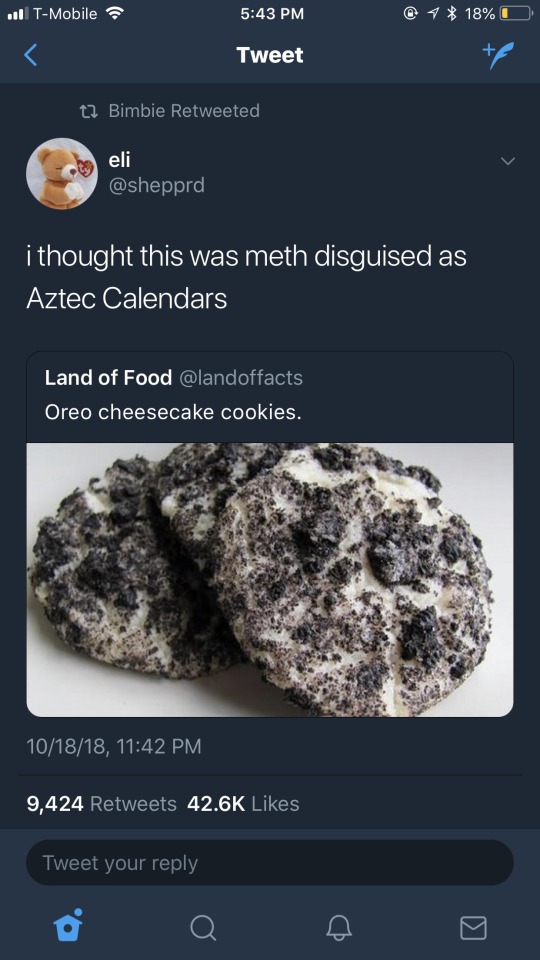I'm Wednesday, 18, Chinese queer (aspiring) polyglot. Native: Cantonese | Fluent: Mandarin and English | Intermediate: French | Beginner: Polish and NorwegianAlso trying to pick up bits and pieces of Russian, Japanese
Don't wanna be here? Send us removal request.
Photo

kot - a regular cat
koshka - a regular female cat
kote (internet slang) - a cute chubby little guy, every single cute cat on the internet
kisa - a pretty, flirtatious, graceful, cranky and haughty lady
kisunya - an extra pretty, flirtatious, graceful, cranky and haughty lady
kis’ - just a dork, controlled by aliens
kotik - a bit more disney version of a regulat cat
koten’ka - cuddly little fella, will purr and knead you to death
kotofei - usually a big, old, extra fluffy cat, who knows a lot of bed time stories
kotyandra - fast, thin and slinky, we not sure if it’s even a cat
koshak - a tough street guy, dogs fear him
kotyara - extra round, exrta big, kind ass fella.
111K notes
·
View notes
Text
Speak better French part 2
SYNONYMES: une chose
-un aspect, un objet, une affaire, un fait, un sujet, un bien, un phénomène, un élément, une particularité, une donnée, un trait, un facteur, un article,
EXPRESSIONS :
Mettre en cause – to question
L’auteur met en cause la décision de marier pour l’argent.
La pertinence – relevance
La pertinence de ce thème devient évidente en regardant plus en détail cet article.
Mener une conversation – to hold, conduct a conversation
C’est essential de parler à haute voix pour mener une conversation.
un rôle crucial/ essentiel/ important – a crucial/ important role
Cet aspect joue un rôle crucial dans ce domaine.
Retracer – to trace
Pour être capable de retracer les étapes qui ont mené à ce résultat, on doit commencer au début.
ILLUSTRATION de quelque chose :
-on peut citer en ce qui concerne
-par exemple quant à
-entre autres à propos de
-notamment au sujet de
-en particulier
[Let me know if there are any mistakes, here is Part 1]
129 notes
·
View notes
Text
@ everyone who said that dnp were queerbaiting: they were hetbaiting.
2K notes
·
View notes
Text
Why not to learn how to write faster?
You probably know, that Russians do not write the way cyrillic letters are printed. Knowing and using it will help you read Russian handwriting and write easier and faster yourself. But if you are not going to write a lot in Russian, or having a real pen pal or going studying in Russia, learning Russian handwriting will probably be useless for you, so decide for yourself, wheather you need it or not. You just have to know, that the eyes of Russian people start to bleed when they see foreigners write the letter Д this way. Here I wrote down the way Russians write letters:

It doesn’t look that different at the first site except that Д looks more like D and you are not going to confuse Л with П anymore, but there are other difficulties:
Keep reading
2K notes
·
View notes
Text
Words to use instead of manger
1. manger- to eat( just getting that out of the way)
2. mordre- to bite
3. mâcher- to chew
4. dévorer- to devour
5. dîner- to dine
6. ingérer- to ingest
7. grignoter- to nibble
8. picorer- to pick at
9. avaler- to swallow
10. digére- to digest
11. engloutir- to scarf down
12. mordre dans- to munch on
13. paître- to graze
14. grignoter- to snack on
15. engloutir- to gobble up
2K notes
·
View notes
Text
🎨art-related words in Polish🎨
Art- sztuka (f) Artfulness- artyzm (m) Painting- malarstwo (n) Sculpture- rzeźba (f) Designing- projektowanie (n) Fashion- moda (f) Drawing- rysowanie (n) Sketching- szkicowanie (n) Still life- martwa natura (f) lit.“dead nature” Print making- druk artystyczny(m) or grafika warsztatowa(f) Mosaic- mozaika (f) Woodcutting- rzeźbienie w drewnie (n) Knitting- tkanie (n) Photography- fotografia (f)
Paint- farba (f) Watercolour- akwarela (f) Oil paint- farba olejna (f), oleje(oils) Acrylic paint- akryl (m) Pencil- ołowek (m) Paintbrush- pędzel (m) Canvas- płótno (n) Easel- sztaluga (f) Ink- tusz (m) Paper- papier (m) Sketchbook- szkicownik (m) Sketch- szkic (m) Medium- medium (n) Tempera- tempera (f) Turpentine- terpentyna (f) Marker- pisak(m) or marker(m) Design or project- projekt (m) Clay- glina (f) Camera- apartat (m)
To paint- malować To draw- rysować To design- projektować To write- pisać To make- robić To sculpt- rzeźbić To build- budować To create- tworzyć To imagine- wyobrażać sobie To colour- kolorować To make up- wymyślić
Artsy- artystyczny Artificial- sztuczny Acrilic- akrylowy Colourful- kolorowy Beautiful- piękny Ugly- brzydki Inspiring- inspirujący Bad- zły Good- dobry Advanced- zaawansowany Beginner- początkujący Photo realistic- fotorealistyczny Realistic- realistyczny
462 notes
·
View notes
Text

oh good lord it’s bad if fox news is also with them
34K notes
·
View notes
Text
*drinks some water* oooh yeah baby…..health goth … *washes hands* ooooooohhh yeah it’s cleancore …
141K notes
·
View notes
Text
“Why can’t I get a girlfriend?” I ask myself, even though I know it’s because I never leave the house and meet new people
2K notes
·
View notes
Text
365 days of Polish
34/365
Likes and dislikes
(bardzo) lubię + acc. | I like… (very much)
kocham + acc. | I love
uwielbiam + acc | I adore
wolę + acc | I prefer
nie lubię + gen. | I don’t like
nie znoszę/ nie cierpię + gen. | I can’t stand
nienawidzę + gen. | I hate
22 notes
·
View notes
Note
Hei! Jeg lurte på hva betyr «til og med»? Også, hvordan brukes «selv»(not in pronouns)? I haven't been able to find much context for these these things and I was wondering if you could use them in a sentence maybe? I love your blog by the way :) Thanks!
Hei! Thank you!
Til og med
1 - ‘Til og med’ and ‘Fra og med’ as “expanded” prepositions to clarify time periods.
“Til og med” (and “fra og med”) are used when referring to times and dates to clarify the start and finish of a period of time. “Til og med” means, quite literally, “Until and including”, and “fra og med” means ‘from and including’. It’s a way of eliminating uncertainty.
Anne har ferie til fredag. - Anne is on holiday until Friday.
In this sentence, there’s an uncertainty as to when exactly the holiday ends. Will Anne be back from holiday on Thursday or Friday? Using ‘til og med’ eliminates this ambiguity, explicitly including Friday in the time period:
Jeg har ferie til og med fredag. - Anne is on holiday until (and including) Friday.
Butikken holder stengt fra og med 23.desember til og med 26.desember. - The store is closed from (and including) December 23 until (and including) December 26.
2 - ‘Til og med’ as an adverb
Used as an adverb, ‘til og med’ is used as the English ‘even’, to say that something is unexpected or surprising.
Jeg gjorde det bedre enn jeg trodde. Jeg klarte til og med å stå på hendene! - I did better than I thought. I even managed to do a handstand!
Til og med lillesøsteren min klarer å stå på hendene. Det er ikke så imponerende. - Even my little sister can do a handstand. It’s not that impressive.
Selv
When it comes to “selv”, it has several different usages. as a neuter noun it means ‘self’. In addition, as you pointed out, it can be used together with the reflexive pronouns (meg, deg, seg, etc.) as a determiner to emphasize a reflective action (Jeg vasker meg selv = I wash/am washing myself). However, it also has other usages.
1 - ‘Selv’ as an adverb
The adverb ‘selv’ means ‘even’ and is synonymous to the adverb ‘til og med’ as I explained it above. It is usually placed in front of nouns.
Til og med lillesøsteren min kan stå på hendene - Even my little sister can do a handstand.
Selv lillesøsteren min kan stå på hendene - Even my little sister can do a handstand.
2 - The conjunction ‘selv om’
‘Selv om’ is used as the English ‘even if’/’’even though’/’although’.
Selv om det gjør vondt, er jeg glad for at vi slo opp. - Even though it hurts, I’m glad we broke up.
De kommer ikke til å komme selv om du skriker - They won’t come even if you scream.
I hope this helps! <3
64 notes
·
View notes
Text
“The lost” grammatical number - Polish
If you ask a Polish native speaker “What kind of number categories do we have?”, they will say “Singular and plural”. Okay, right - but it’s not enough.
In Polish we’ve got two basic number categories - liczba pojedyna (singular) and liczba mnoga (plural). We often forget that centuries ago Slavic languages had another number category - liczba podwójna (dual). It seems that Proto-Slavic langueage (if there was one) had a complete singular-dual-plural number system. Old Church Slavonic texts are proofs that dual was “a thing” in Slavic society. In modern times dual is rarely used in Slavic languages. As an active part of languages it is still used only in Slovene (South Slavic language), Chakavian (a dialect of the Serbo-Croatian language) and Sorbian (West Slavic language).
Okay, but let’s go back to Polish language - do we really have dual? The answer is… NO. It probably disappeared in 15th century. But we’ve got remains of it. Where?
in a few nouns used on daily basis (and their declension)
in proverbial phrases
in colloquial conjugation of verbs
Nouns - body
What kind of nouns should we take under consideration? Let’s think about nouns that usually go in pairs. Humans have two arms, two legs, two eyes, two ears, two feet and so one - it’s rare to have one arm or three arms, right? So right now we now that dual was used for double parts of human body. In Polish we’ve got remains of dual in nouns like:
oko n (eye)
ucho n (ear)
ręka f (arm, hand)
Take a look at the declension of these nouns.

Words in yellow are remains of dual. In brackets you’ve got a word “two”.
But we still don’t know why this words are connected with dual? Now, look below - how dual used to work in Polish language. We’ve got 3 words - mąż m (man, human), ręka f (hand, arm) and lato n (summer).

As you can see the endings of some forms in plural and dual are similar or even the same (especially in ręka). Underlined words are already archaic and not used at all in Polish language.
Nouns - “not body”
There was no rule that you should have used dual only for human body parts. You could decline almost every noun - or even numbers. Right now in Polish we’ve got a word dwieście - two hundred. It’s a weird number because in Polish you count this way: sto (100), dwieście (200), trzysta (300), czterysta (400), pięćset (500), sześćset (600) etc.There is something wrong with dwieście… It’s a combination of two numbers - dwa (2) and sto (100). Look at the declension of lato n - in nominative you’ve got a phrase dwie lecie. 200 is very similar in this case, because you’ve got the same form of number 2 (dwie) and endings (lecie, dwieście).
In Polish we’ve got also so called pluralia tantum - nouns that are only plural. This also reminds us that Polish language used to have dual. We’ve got words like nożyczki/nożyce (scissors), spodnie (trousers), drzwi (doors). Scissors have two cutting edges, trousers have two legs, doors used to have two wings.
Proverbial phrases
Only to proverbs have in them nouns in dual form (because it rhymes). Every dual noun is placed after a word “two”.
trzy gęsi, dwie niewieście uczyniły jarmark w mieście - (three geese, two women made a fair in a city) to be loud
mądrej głowie dość dwie słowie - (two words are enough for a wise head) - a word is enough to the wise
Verbs
Okay, this one is weird, because we think of dual as something connected only with nouns. But let’s think about pronouns - we (me + sb else), you (you <singular> and sb else), they (sb + sb else). We’ve got different endings for them, modern plural endings are completely different:

Yellow means that it has something to do with dual. Have you ever heard a phrase from your parents “do what you want”? Of course! In Polish you would say rób, co chcesz. Sometimes you can also hear a phrase of the same meaning but with different ending - róbta, co chceta. In this case it doesn’t mean that your mom/dad tells you + sb else to do what you and your partner in crime want. Modern Polish doesn’t use dual, so your parent says it to one person - you (singular) - or two the 2 or more people - you (plural).
You can combine the dual ending -ta with other verbs, for instance: musita (you have to), idźta (<you> go), śpijta (<you> go to sleep), chodźta (<you> come) - they are all in imperative mood, that’s important! And quite rude.
147 notes
·
View notes
Text
Polish (Im)perfective Counterparts
So I’ve been learning Polish for two years and a bit now and I remember the first thing I dreaded was remembering all the (im)perfective counterparts of verbs (let alone how to use them, which is probably explained very well in other posts already), so here’s a nice list of some patterns which I’ve noticed that might make this easier. This’ll probably be some long post that’ll end up looking like my notes, but have it anyway!
Keep reading
111 notes
·
View notes
Text
Stress
This is actually one of the easier things in Polish language. Unlike for example Russian or Ukrainian, Polish has fixed stress and in 99% of cases the last but one syllable is pronounced:
wóda [ˈvɔda]
budýnek [buˈdɨ̃nɛk]
nastawiénie [nastaˈvjɛɲɛ]
There are two groups of words in which the third syllable from the end of the word is stressed. However the rule is one thing and the usage is the other so you may hear those words being pronounced with the last but one syllable stressed as in most words:
Name of sciences that are Greek loanwords and end with -yka or -ika:
matemátyka [matɛˈmatɨka]
fízyka [ˈfizɨka]
lógika [ˈlɔgika]
Past forms of verbs conjugated in 1st and 2nd person of plural and ending with -liśmy, -liście, -łyśmy or -łyście:
pószliśmy [ˈpɔʃliɕmɨ]
wypíłyśmy [wɨˈpiwɨɕmɨ]
uciékłyście [uˈʨɛkwɨɕʨɛ]
In some French loanwords the last syllable is stressed:
menú [mɛˈɲi]
purée [piˈrɛ]
sauté [sɔˈtɛ]
But it does not concern all of French loanwords. Some of them are stressed on last but one syllable like most of the words in Polish:
párter [ˈpartɛr]
számpan [ˈʃãmpãn]
190 notes
·
View notes
Text
Ice cream vocabulary - Polish

Loosely based on @languageoclock‘s POST.
NOUNS:
chocolate curls – wiórki czekoladowe (pl.)
chocolate sprinkles – posypka czekoladowa f
cone – wafelek m
cream – śmietana f / śmietanka f
cup – kubeczek m
flavour/taste - smak m
freezer – zamrażalnik m / zamrażarka f
ice – lód m
ice block – kostka lodu f
ice cream – lody (pl.) [sometimes also lód m]
ice cream cake – tort lodowy m
ice cream carton – lody w pudełku (pl.)
ice cream kiosk – budka z lodami f
ice cream parlour – lodziarnia f
ice cream (plastic) spoon – (plastikowa) łyżeczka do lodów f
ice cream sandwich – kanapka lodowa f
ice cream scoop – łyżka do lodów f / gałkownica f
ice cream truck – samochód m / ciężarówka f / furgonetka f z lodami
ice (cream) on a stick – lód na patyku m
icy pole – pałeczka lodowa f
sauce – polewa f
scoop of ice cream – gałka lodów f
soft ice cream/soft serve – lody włoskie (pl.) or lody amerykańskie (pl.) / świderek m *
sorbet – sorbet m
sprinkles – posypka f
sugar sprinkles – posypka cukrowa f
waffle cone – wafelek m
whipped cream – bita śmietana f
ADJECTIVES:
cold - zimny
creamy – śmietankowy
crisp/crunchy – chrupki / chrupiący
dairy free – bez mleka / bezmleczny
frozen – zmrożony
gluten free – bez glutenu / bezglutenowy
lactose free – bez laktozy
melting – roztapiający się
sugar free – bez curku / bezcukrowy
sweet - słodki
tart – cierpki / kwaśny
vegan - wegański
VERBS:
to go for an ice cream – pójść (pf.) / iść (impf.) / chodzić (impf.) na lody
to scoop ice cream/to make scoops of ice cream – nałożyć (pf.) / nakładać (impf.) gałkę lodów (gałki lodów – pl.)
to store something in the freezer – trzymać (impf.) coś w zamrażarce / zamrażalniku
to taste like something – smakować (impf.) jak coś
I would like to order… – chciałbym zamówić…
two scoops of (strawberry) ice cream, please - poproszę dwie gałki lodów (truskawkowych)
ICE CREAM FLAVOURS
If you want to order a particular flavor, you’ve got three ways of how to say it:
Poproszę czekoladę i cytrynę – Chocolate and lemon ice cream, please (usually used while ordering scoops of ice cream)
Poproszę lody czekoladowe i cytrynowe – Chocolate and lemon ice cream, please (used while buying ice cream at the shop/supermarket etc. or while ordering scoops of ice cream)
Poproszę lody o smaku czekoladowym i cytrynowym (used while buying ice cream at the shop/supermarket etc. or while ordering scoops of ice cream)
banana – lody bananowe - lody o smaku bananowym / banana – banan m
caramel – lody karmelowe - lody o smaku karmelowym / karmela – karmel m
cherry – lody wiśniowe - lody o smaku wiśniowym / wiśni – wiśnia f
coconut – lody kokosowe - lody o smaku kokosowym / kokosa – kokos m
coffee – lody kawowe - lody o smaku kawowym / kawy – kawa f
cookie/biscuit – lody ciasteczkowe - lody o smaku ciasteczkowym / ciasteczek – ciasteczko n
creamy – lody śmietankowe – lody o smaku śmietankowym / śmietanki – śmietanka f
currant – lody porzeczkowe – lody o smaku porzeczkowym / porzeczki – porzeczka f
grapefruit – lody grejpfrutowe – lody o smaku grejpfrutowym / grejpfruta – grejpfrut m
hazelnut – lody orzechowe - lody o smaku orzechowym / orzecha – orzech m
kiwi – lody kiwi – lody o smaku kiwi – kiwi n
lemon – lody cytrynowe - lody o maku cytrynowym / cytryny – cytryna f
mango – lody mango - lody o smaku mango – mango n
Nutella – lody o smaku Nutelli – Nutella f
peach – lody brzoskwiniowe – lody o smaku brzoskwiniowym / brzoskwini – brzoskwinia f
pear – lody gruszkowe – lody o smaku gruszkowym / gruszki – gruszka f
peppermint – lody miętowe - lody o smaku miętowym / mięty – mięta f
pineapple – lody ananasowe – lody o smaku ananasowym / ananasa – ananas m
pistachio – lody pistacjowe - lody o smaku pistacjowym / pistacji – pistacja f
raspberry – lody malinowe - lody o smaku malinowym / maliny – malina f
stracciatella – lody stracciatella – lody o smaku stracciatella / stracciatelli – stracciatella f
strawberry – lody truskawkowe - lody o smaku truskawkowym / truskawki – truskawka f
vanilla – lody waniliowe - lody o smaku waniliowym / wanilii – wanilia f
with dried fruts and nuts – lody bakaliowe – lody o smaku bakaliowym / bakalii – bakalie (pl.)
zabaglione – lody zabajone – lody o smaku zabajone – zabajone n
NOTES: * We’ve got two versions of soft ice cream:
lody włoskie (Italian ice cream)

lody amerykańskie (American ice cream) / świderki

** There is also another thing you should be aware of… Please, do not say zrobić (pf.) / robić (impf.) loda (literal translation: to make an ice cream) - it means to give a blowjob. And lodziara f is a woman who gives a lot of blowjobs. If you ask sb Zrobisz mi loda? (Will you make me an ice cream?), this person may think about sth NSFW.
249 notes
·
View notes



